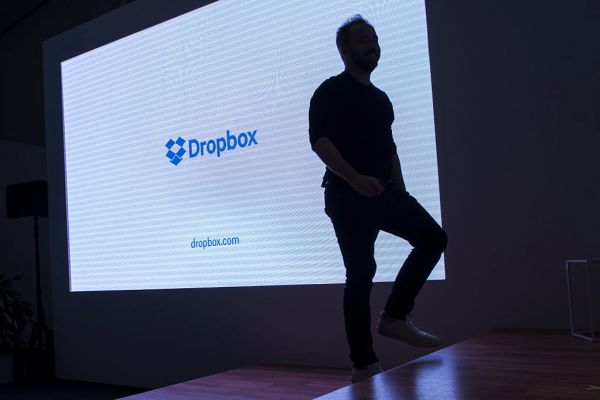
It’s a big day for Dropbox — the first marquee Web 2.0 name to go public this year and one of the biggest since Snap last year — which made its public debut today, with the stock soaring nearly 43% to around $30 in its first moments of trading.
Today’s debut for the enterprise-slash-consumer company is the culmination of plenty of headwinds — and tailwinds — that first questioned the valuation it got during the crazy Silicon Valley hype cycle before building up the confidence to bring it right back up. Dropbox’s last private valuation was around $10 billion, but throughout the IPO pricing process that companies use to essentially discover what investors are willing to pay, Dropbox’s valuation largely remained below that. But that price, starting at a range between $16 and $18, slowly ticked up before settling on $21 per share last night. Now, it’s gone well above that.
Dropbox first rode a wave of consumers increasingly adopting the cloud and storing their files online where they could access them anywhere, where its growth and emerging businesses sent it to a $10 billion valuation. Then, it rode a second wave of small teams in businesses that decided to adopt tools like Dropbox, which may have not yet been tuned for massive companies, simply because they were easier to use than existing ones. And finally, that playbook turned out to be wildly successful for many companies, which used that as a jumping point to get full company adoption and eventually get the C-suite on board with it and other collaboration products.
Since that hyped valuation, Dropbox has hit a number of milestones, including hitting a $1 billion revenue run rate (it generated $1.1 billion in revenue last year), picking up 500 million registered users, and having 11 million paying customers. Over the past few years it’s tried to go beyond just file-sharing in the enterprise with tools like Dropbox Paper, a Quip or Google Docs competitor that’s designed to be a kind of continuous document for coming up with ideas like a product spec or marketing roadmap, among a lot of updates to its mobile application.
Amid all of this, Dropbox founder Drew Houston — who will be one of Y Combinator’s first major IPO success stories — still owned nearly 30% of the company, and co-founder Arash Ferdowsi owned around 12.2% of the company. Y Combinator has a deep bench of companies that all look like good IPO candidates like Airbnb or Stripe, but Dropbox was one of the earliest startups to go through back in 2007. The IPO will, too, be a massive windfall for Sequoia Capital which continues to own 25% of the company.
“Houston has] really evolved over the years as an incredible leader, he’s grown this company, he’s navigated through all different parts of this life cycle,” Y Combinator founder and partner Jessica Livingston said. “Our goal in many ways was to empower founders. It was to level the playing field, you don’t have to have a connection in Silicon Valley to get funding. I feel like, 13 years ago, [having a YC company go public] was just this dream of ours. It was almost seemingly unattainable dream — maybe one of the startups we fund could go public someday. That was the holy grail. It’s an exciting day for YC. It shows what a long game investing in early-stage startups is.”
There’s already been a wave of activity on the enterprise market, with Salesforce acquiring Mulesoft for $6.5 billion being the exclamation point of 2018 thus far. But enterprise security company Zscalar already had a massively successful IPO with the price nearly doubling, and subscription billing tools service Zuora is also set to go public. These kinds of tools serve as the backbones of modern Web companies, and whether they’re household names or not, they have the capacity to go public due to the sheer scale of the market opportunity — even if it takes a while to get there.
Enterprise IPOs are usually the kind of backbone of a lot of venture firms because they’re predictable. The buying cycles are long, the path to profitability is a little more obvious, and the business model comes more down to execution than the whims of consumers. But in recent years, Dropbox has occupied a kind of weird spot in that spectrum as a company looking to share a big slice of the enterprise collaboration market with something that was born for, and still very much in service to, the average consumer. Dropbox will serve not only as a barometer for enterprise IPOs coming through the door over the next few months, but likely IPOs across the board.




